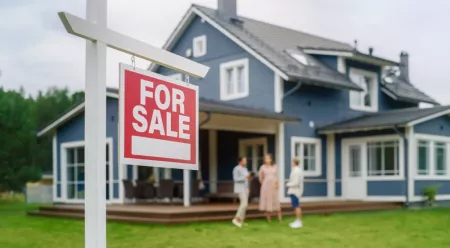Are you familiar with the saying, "make your money work for you?". This is another way of stating that you should look for ways to invest your money and earn passive income.
A fantastic way of generating passive income is by investing in a strata property (also referred to as condominiums or condos outside of British Columbia).
However, as with any investment, we suggest that you do some research instead of diving in headfirst. This gives you a better idea if a strata property is a worthwhile (or feasible) investment.
START A QUOTE
What is strata property?
A strata property is similar to a traditional apartment in several ways. In many cases, they are found in high-rise buildings or vast complexes and are most common in highly-populated cities.
However, there are also a handful of key differences that you should know before investing:
Ownership
In most cases, people will rent an apartment, not purchase one as an investment. This is because high-rise buildings are generally owned by corporations, groups, or even the local government.
On the other hand, when you invest in a strata property, you're technically purchasing a "portion" of the property, not the entire building. After buying a strata property, you are free to live in it, rent it out, etc.
Property manager
Strata properties generally have property managers; which begs the question, “what is a strata manager and what do they do?”.
Property managers are professionals who are hired by the strata council. These individuals are responsible for a long list of tasks around the property, some of which include:
- Day-to-day activities (general correspondence, hiring staff/third party services, etc.)
- Ensuring the property is clean and presentable
- Dealing with problems as they arise (disputes, damage, general repairs, etc.)
- Manage finances
In short, the property manager will do the lion's share of the legwork for you, giving you more time to enjoy your newly-earned passive income.
Pros of investing in a strata property
There are several positive aspects to investing in a strata property. Some of these favourable factors include:
Low barrier of entry
When buying a property, you're required to make a down payment. A down payment is a large initial payment made when purchasing a big-ticket item (generally properties) on credit.
If you're purchasing a property for under $500,000 (as an owner-occupied property), you have to make a 5% down payment on the home. However, homes over $500,000 require a much larger down payment, ranging from 10% to 20%, depending on the property's price.
On the other hand, if you are purchasing a property, like a strata, as an investment (non-owner occupied property), you're generally required to make a 20% down payment.
In Vancouver, the average size of a detached home is approximately 2,077 square feet. In comparison, the average size of a strata property is 769 square feet. Additionally, the average price per square foot of a detached home in Vancouver is $1,279, while the average price per square foot of a strata property in the same area is $1,044.
Now that we have this information let's figure out the price differences.
With this data, we can determine that the typical detached home in Vancouver costs approximately $2,656,000, while the cost of the common strata property is roughly $802,000.
If we assume that you have to make a 20% down payment for both properties, we can find that you would have to make a $531,000 down payment on a detached home or a $160,400 down payment on a strata property.
Although the prices will vary from city to city, this is a fantastic example of how strata condos have a lower barrier of entry, making them an excellent choice for first-time property investors.
Less maintenance
As we mentioned earlier, if you invest in a strata unit, you'll have access to the property manager, who can help you take care of several tasks.
Having a property manager allows you to save massive amounts of time and energy. Not to mention, it helps prevent a lot of unnecessary stress.
Cons of investing in a strata property
Even though investing in a strata property can be extremely rewarding and lucrative, there are a few negatives that potential investors may want to know:
Insurance is required
We have a hard time calling this a negative aspect because insurance companies are here to help, but we understand that strata insurance comes at a cost. This expense eats into the passive income you've worked hard to achieve.
Investors need to get two primary types of strata insurance in Canada: property insurance and liability insurance.
Property insurance covers the strata, common property and the contents listed in the property title. Some of the contents covered by property insurance include:
- Gardens and gardening equipment
- Swimming pools
- Flooring
- Car parks
Whatsmore, property insurance protects strata owners from a variety of, what the insurance industry refers to as, risks and perils (jargon for unforeseeable or unavoidable disasters). Some of the risks and perils strata owners need coverage for include:
- Windstorms
- Lightening
- Explosions
- Impact from aircraft or vehicle
- Fire and smoke damage
- Hail
- Water
On the other hand, liability insurance helps protect strata property owners from incidents like injury or death.
For example, if an individual slipped on wet flooring in a common area and made a claim, you, as the owner, will be deemed liable. Thankfully, if a claim is made, your strata liability insurance will cover the expenses (if applicable under your policy).
For more information on strata property and liability insurance, you should reach out to your insurance provider. Your insurance agent can walk you through the minute details of your policy and help you understand what is and isn't covered.
Making renovations can be time consuming
Even though you own your strata, you don't have the freedom to make impromptu renovations or changes.
If a strata owner wants to renovate their property, they need to consult a legal entity called the body corporate. The strata owner must attend a corporate meeting and complete the confirmation process to meet with the body corporate.



